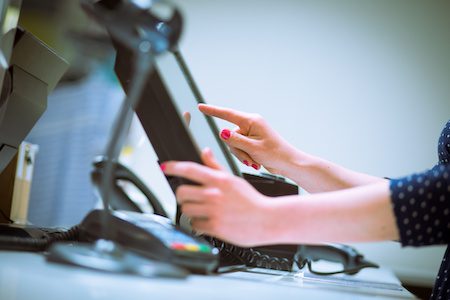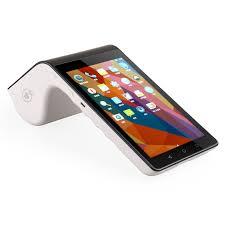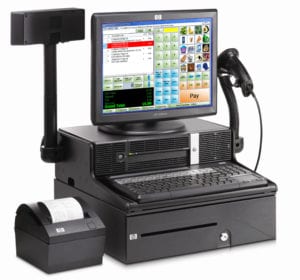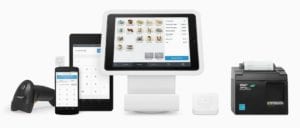
Finding the Best POS System for Small Businesses
A POS system is a great tool as it could prevent your small business from getting bogged down with time-consuming business obligations. The right POS system for small businesses will help you keep track of inventory and process payments efficiently, just like your biggest competitors.
Navigating the world of POS systems can be daunting as a small business owner. With so many options on the market, it can be hard to know where to start.
It's important to take the time to find the right one for your needs. Here, we'll provide some tips on how to choose the best POS system for your business.
So read on to better understand POS systems and what to look for when choosing one for your small business.
What Is a POS System?
A POS system is software that helps businesses accept payments from their customers and keep track of sales, inventory, and customer data. It comprises hardware components such as a barcode scanner, a receipt printer, and a cash drawer.
The POS system also has a software component, which is the actual POS software. The final feature is the payment component, which allows customers to pay for their purchases.
Why Does Your Small Business Need a POS System?
A POS system for small businesses will help you save time and money. For example, it will eliminate the need for manual data input into a spreadsheet.
POS systems can also help you keep track of your inventory. Tracking is important because it can help you avoid over-ordering or running out of stock. With a POS system, you can see what's in stock and what you need to order.

A POS system for small retail businesses will make it easy for you to process payments more efficiently. This is especially important if you're selling products or services online. The system will help you accept payments and track your sales.
Finally, POS systems can help you manage customer data. The data includes customer contact information, purchase history, and preferences. You can use this data to create targeted marketing campaigns and improve the overall customer experience.
How to Find the Best POS System
Now that you know what a POS system is and why you might need one, it's time to learn how to choose the best POS system for your business. You should take the following steps:
Determine Your Business Needs
The first step is to determine the business needs you want to meet using a POS system. This step will help you narrow down your options and choose the right system.
Your POS system needs will depend on the products and services you offer. For example, if you're a restaurant, you'll need a system that can track inventory and manage orders.

You should also consider your business's size and growth potential. If you're a small business, you might not need all the bells and whistles of a more advanced system. But, if you're planning to grow, you'll want a system that can scale with you.
Think about what features are most important to you and your business. For example, if you sell products online, you'll need a POS system that can integrate with your eCommerce platform. On the other hand, if you run a brick-and-mortar store, you'll need a system that can track inventory and process payments.
If you interact with your customers, you'll need a POS system to manage customer data. You can use the data for marketing and to improve the overall customer experience.
Invest in Market Research
Once you determine the key features that your POS system should have, you should start looking for solutions that suit your needs. Google will likely be your best friend during this process.
Start by researching POS systems that are designed for businesses like yours. For example, if you have a retail business, look for POS systems designed for retailers.
You should also read the reviews of different POS systems on third-party review websites such as Side by Side Reviews. These sites will give you a better idea of which systems are most popular or have the features that align with what you're looking for.
You can research which POS systems are common for businesses similar to yours. In this case, you can talk to other business owners. You can visit the entrepreneurs in your network and see how their systems are working.
Ask the business owners whether they would recommend their current POS system and the features they like most. If you're in social media groups, ask other members about their POS systems and the ones they would recommend.
Talk to POS System Providers
The research will help you narrow down your options to a few POS systems. Once you have a shortlist of potential systems, you should contact the providers and request demos.

When speaking with different POS system providers, pay attention to how they answer your questions. They should be able to give you clear and concise answers. If they can't, it might be a sign that they're not the most knowledgeable about their product.
You should also ask about pricing. Some providers might have lower upfront costs but higher monthly fees. Others might have higher upfront costs but lower monthly fees. You should find a balance that fits your budget.
Finally, you should ask about support. Once you purchase a POS system, you'll likely need help. It's important to find a provider that offers excellent customer support.
Evaluate the Demo
When you receive the demo, pay attention to how user-friendly the interface is. The system should be easy to navigate and understand. If it's not, it might cause frustration for you and your employees.
You should also test out all the features that are important to you. For example, if you're a retailer, you should test the system's inventory management features. If you're a restaurant, you should test the system's order management features.
Once you've tested all the features, you should know whether the POS system fits your small business.
Make Your Decision
Once you've explored the various options on the market, you'll need to make a decision on the POS system that best suits your small business. When deciding, you should consider the following factors:
Your Budget
The price of POS systems can range from a few hundred dollars to several thousand dollars. You need to find a system that fits your budget. If you’re just starting your business or have a tight budget, you can opt for free POS systems for small businesses.
However, you can find affordable POS systems for small businesses that offer various features. Most will require you to pay a lower initial setup cost and a monthly fee. Choose the system that won't strain your small business revenues.
Integration
Your POS system should integrate with the other software you're using for your business. For example, if you're using QuickBooks for accounting, your POS system should be able to integrate with it.
This will make it easier to manage your finances and reduce the chances of human error. Look for a system that can easily integrate with your current software to avoid problems that may disrupt your business operations.
Customer Support
You should find a POS system provider that offers excellent customer support. This aspect is important if you run into any problems with the system.
When speaking with different providers, ask about their customer support offerings. Find out how they can help you if you have problems with the system.
The Type of POS System
When choosing a POS system for your small business, you'll need to decide on the type of system that's right for you. You’ll find three main types of POS systems for small businesses.
One is cloud-based POS systems, hosted on the provider's servers. They’re easy to set up and use.
They're also more affordable than on-premises POS systems. Since they operate online, it'll be easy for you to access data from anywhere.
The second type is on-premises POS systems. These systems are hosted on your servers and are more expensive than cloud-based POS systems. They're also more difficult to set up and use.
The final type is hybrid POS systems, which are a combination of cloud-based and on-premises systems. They offer the best of both worlds. They're more expensive than cloud-based POS systems but less expensive than on-premises POS systems.
Finding the Best POS System for Small Businesses Made Easy
Finding the best POS system for small businesses doesn't have to be difficult. By following these tips, you can find a system that fits your budget and offers the features you need. Do your research, compare different systems, and test out the demo before making your decision.
If you’re looking for the best POS system for your small retail business, contact us at Side By Side Reviews to get quotes. We have experience in identifying, reviewing, and ranking the best POS systems. We will be glad to match you with the best option.
Author: Hudson Piccini
Hudson Cynar, a Harvard University alumna and the owner of three prosperous enterprises, is a distinguished business consultant, author, and writer. Her expertise spans multiple business sectors, with a particular emphasis on storage containers, commercial copiers, payroll services, and medical billing software. Dedicatedly investing thousands of hours into product and service research, Hudson crafts insightful reviews to guide entrepreneurs in making informed decisions for their businesses.
